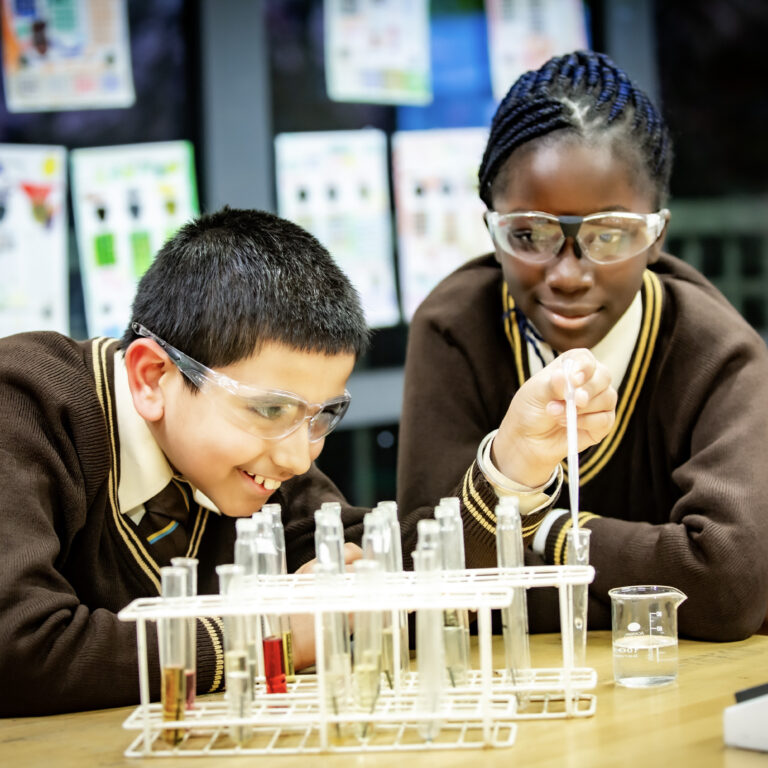
Design & Technology
Design and Technology is an essential part of the One Curriculum because it gives young people the skills and abilities to engage positively with the designed and made world and to harness the benefits of technology. They learn how products and systems are designed and manufactured, how to be innovative and to make creative use of a variety of resources including digital technologies, to improve the world around them. Design and Technology is a logical and creative subject allowing pupils an opportunity to apply what they learn in maths and science to their outcomes.
Design and Technology is a practical and rigorous subject which encourages learners to use their creativity and imagination to solve real and relevant problems within a variety of contexts. Learners have an opportunity to consider their own and others’ needs, wants and values in this process.
DT develops a broad range of subject knowledge and draws on disciplines such as mathematics, science, engineering, computing, geography and art.
Lower School – Key Stage 1
At Gad’s Hill, Design Technology is a dynamic and integral part of The One Curriculum, igniting creativity, curiosity, and confidence in every child. Through engaging, hands-on projects with real-world purpose, pupils explore mechanical systems, structural design, and material properties—investigating how components interact, how products function, and how designs can be improved. In doing so, they develop not only practical skills, but also critical thinking, problem-solving, and the resilience to learn through iteration.
Our approach is underpinned by challenge, progression, and the design cycle. From the early years through to year 6 pupils build steadily on prior knowledge—advancing from simple mechanisms to complex systems—always encouraged to think independently and approach problems with innovation and persistence. Lessons are thoughtfully differentiated to support and stretch all learners, enriched by meaningful cross-curricular links, STEM initiatives, and opportunities to showcase their designs.
Design Technology at Gad’s Hill cultivates vital life skills that extend far beyond the classroom. Pupils learn the value of collaboration, communication, and constructive feedback. They develop time management, adaptability, attention to detail, and the ability to evaluate and refine their ideas. Most importantly, they grow as empathetic, forward-thinking individuals who understand the importance of sustainability, user-centred design, and ethical decision-making.
Whether researching products, engineering a Roman chariot, or evaluating the success of a soft toy prototype, our pupils are encouraged to take risks, embrace feedback, and continually improve their outcomes.
Design and Technology at Gad’s Hill develops pupils’ confidence, mindset, and transferable skills to succeed in an ever-evolving world.
Lower School – Key Stage 2
Design and Technology is a vital subject that encourages creativity, innovation, and practical problem-solving. At Gad’s Hill, it gives students the opportunity to explore how products are designed and made, develop real-world skills, and understand the impact of design on daily life. It empowers students to become resourceful, reflective, and resilient individuals who are ready to contribute to a technologically evolving world.
Promotion of Skills, Knowledge, and Values
D&T fosters a wide range of transferable skills including critical thinking, teamwork, communication, time management, and independent learning. Pupils develop technical knowledge in materials, electronics, and design processes while learning the value of sustainability, ethical responsibility, and user-centred thinking. It instils a growth mindset through experimentation, iteration, and hands-on creation.
Key Themes Studied
- Product Design
- Prototyping
- Textiles and Decorative Techniques
- CAD/CAM (Computer-Aided Design and Manufacture)
- Sustainability and Environmental Impact
- Health and Safety in the Workshop
Progression of Knowledge and Skills
Students build foundational skills in designing, making, and evaluating. As they progress through the school, they tackle more complex design briefs, work with a range of materials, and develop independence in managing design projects
Support for Wider Learning
Design and Technology reinforces and applies knowledge from other subjects such as Maths (measuring, geometry), Science (forces, materials, energy), and Computing (CAD and digital modelling). It supports literacy through written evaluations and reports and promotes numeracy through precise measurements and calculations.
Upper School – Key Stage 3
Design and Technology is a vital subject that encourages creativity, innovation, and practical problem-solving. At Gad’s Hill, it gives students the opportunity to explore how products are designed and made, develop real-world skills, and understand the impact of design on daily life. It empowers students to become resourceful, reflective, and resilient individuals who are ready to contribute to a technologically evolving world.
Promotion of Skills, Knowledge, and Values
D&T fosters a wide range of transferable skills including critical thinking, teamwork, communication, time management, and independent learning. Pupils develop technical knowledge in materials, electronics, and design processes while learning the value of sustainability, ethical responsibility, and user-centred thinking. It instils a growth mindset through experimentation, iteration, and hands-on creation.
Key Themes Studied
- Product Design
- Prototyping
- Textiles and Decorative Techniques
- CAD/CAM (Computer-Aided Design and Manufacture)
- Sustainability and Environmental Impact
- Health and Safety in the Workshop
Progression of Knowledge and Skills
Students build foundational skills in designing, making, and evaluating. As they progress through the school, they tackle more complex design briefs, work with a range of materials, and develop independence in managing design projects
Support for Wider Learning
Design and Technology reinforces and applies knowledge from other subjects such as Maths (measuring, geometry), Science (forces, materials, energy), and Computing (CAD and digital modelling). It supports literacy through written evaluations and reports and promotes numeracy through precise measurements and calculations.
Upper School – Key Stage 4
Design and Technology is a vital subject that encourages creativity, innovation, and practical problem-solving. At Gad’s Hill, it gives students the opportunity to explore how products are designed and made, develop real-world skills, and understand the impact of design on daily life. It empowers students to become resourceful, reflective, and resilient individuals who are ready to contribute to a technologically evolving world.
Promotion of Skills, Knowledge, and Values
D&T fosters a wide range of transferable skills including critical thinking, teamwork, communication, time management, and independent learning. Pupils develop technical knowledge in materials, electronics, and design processes while learning the value of sustainability, ethical responsibility, and user-centred thinking. It instils a growth mindset through experimentation, iteration, and hands-on creation.
Key Themes Studied
- Product Design
- Prototyping
- Textiles and Decorative Techniques
- CAD/CAM (Computer-Aided Design and Manufacture)
- Sustainability and Environmental Impact
- Health and Safety in the Workshop
Progression of Knowledge and Skills
By Key Stage 4, students refine their ability to research, plan, model, and present functional and creative solutions to real-life problems.
Support for Wider Learning
Design and Technology reinforces and applies knowledge from other subjects such as Maths (measuring, geometry), Science (forces, materials, energy), and Computing (CAD and digital modelling). It supports literacy through written evaluations and reports and promotes numeracy through precise measurements and calculations.
Future Pathways
Design and Technology provides a strong foundation for GCSE D&T and future study in engineering, architecture, product design, graphic design, fashion, and construction. The skills developed are also highly relevant to apprenticeships, technical careers, and entrepreneurial pathways.

